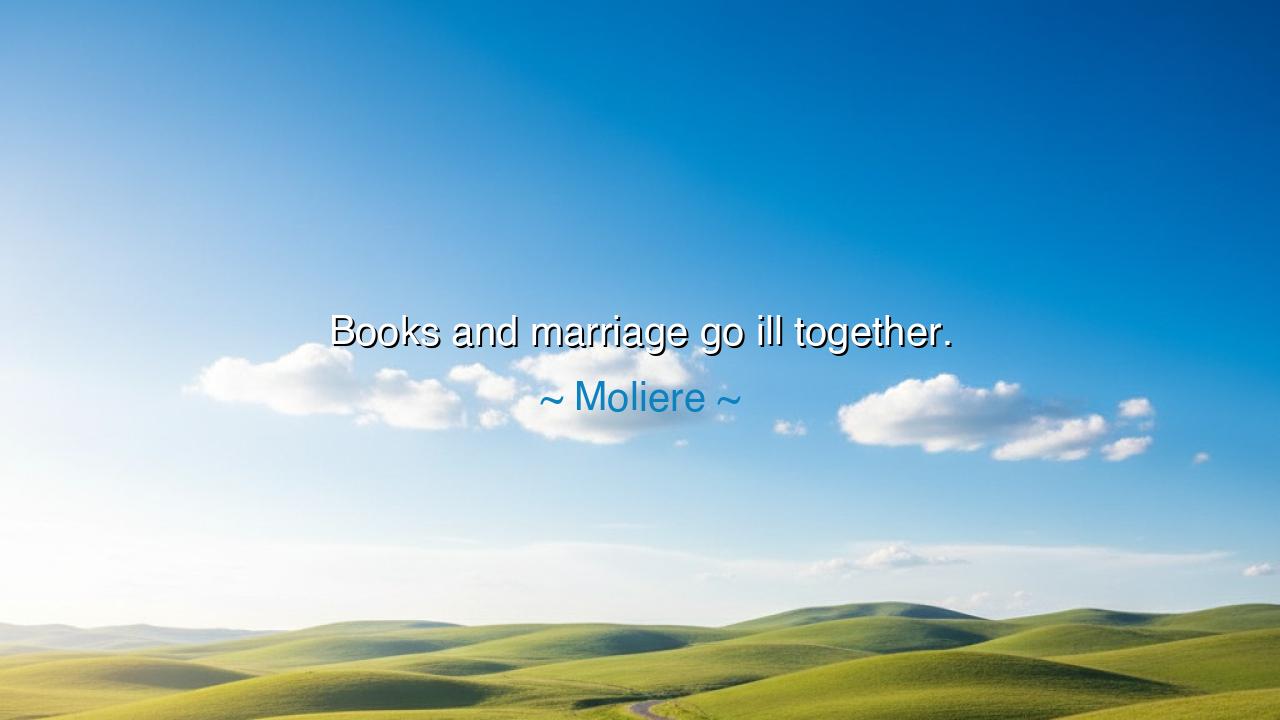
Books and marriage go ill together.






In the sharp and satirical words of Molière, the great French playwright of wit and wisdom, there lies both humor and truth: “Books and marriage go ill together.” At first glance, his words appear mischievous, even cynical—a jest made at the expense of domestic life. Yet, as with all of Molière’s insight, beneath the laughter there lies a mirror held up to the soul of society. He speaks not against books, nor against marriage, but against the conflict that arises when the love of knowledge meets the conventions of daily life—when the freedom of thought encounters the duties of the home. It is a cry from the heart of one who has observed the struggles of human relationships and the burdens they place upon the intellect and imagination.
The meaning of this quote reaches beyond the surface jest of marital tension. To Molière, books represent the realm of contemplation, curiosity, and freedom—the quiet sanctuaries where the soul wanders unbound. Marriage, on the other hand, symbolizes the practical world of human ties—love, duty, compromise, and constant engagement with the needs of others. When he says that they “go ill together,” he speaks of the difficulty of uniting the solitary pursuit of truth with the shared demands of daily life. The mind that seeks wisdom must often retreat into silence; yet marriage calls for the music of companionship. The heart that seeks knowledge yearns for solitude; yet love demands presence. Thus, Molière reveals a tension eternal in human life: the struggle between the inner world of reflection and the outer world of responsibility.
The origin of this saying lies within the world Molière inhabited—a world of rigid social structures, moral hypocrisy, and the ceaseless dance between intellect and convention. Living in seventeenth-century France, he was surrounded by scholars, clergy, and noblemen who prized reputation over reason. Through his plays, such as Tartuffe and The Misanthrope, he exposed the follies of his time with wit so sharp that it drew both laughter and wrath. His jest about books and marriage may have been born from his own life, for Molière himself endured a turbulent marriage to Armande Béjart, a woman much younger than he, whose flirtations and ambitions often clashed with his own. For a man devoted to the theater—a temple of both art and intellect—such domestic storms must have felt like shackles upon the spirit. His words, then, come not from disdain, but from experience: the lament of one who knows that wisdom demands solitude, yet the heart demands companionship.
History offers many who have shared Molière’s paradox. Consider Leo Tolstoy, the great Russian novelist, who sought divine truth and moral purity while bound in a marriage that grew bitter with time. His wife, Sofya, loved him but could not comprehend his growing asceticism; he, in turn, could not reconcile his spiritual longing with the daily realities of family life. Their home became a battleground of ideals and emotions. Tolstoy’s story mirrors Molière’s insight: that the union of intellectual pursuit and domestic harmony is rare, for the two call the soul in opposite directions. The thinker seeks clarity, the lover seeks connection; the philosopher pursues eternity, the spouse must attend to the hour.
Yet Molière’s quote, though humorous in tone, need not be read as despair. There is in it a quiet warning and wisdom. He reminds us that balance must be sought between the life of the mind and the life of the heart. If one devours the other, both will suffer. The scholar who buries himself in books may forget the warmth of human touch, and his knowledge will grow cold. The lover who neglects reflection for passion may find her affection fading, for love without wisdom cannot endure. Thus, Molière teaches that though “books and marriage go ill together,” they need not be enemies—they must, instead, be kept in harmony, as two strings upon the same lyre, each requiring its own tension and its own tune.
His words also carry a deeper philosophical reflection: that all human life is a balancing act between freedom and responsibility. The book represents freedom—the unbound exploration of the soul. Marriage represents responsibility—the sacred bond to another life. To live fully is to walk between these realms without losing either one. Molière’s jest is thus a mirror of our own struggle: how to remain a seeker of truth without forsaking the bonds of love, how to think deeply while living fully, how to be both wise and warm-hearted.
Therefore, O listener, take this lesson to heart: guard your solitude without forsaking your connections; nurture your intellect without neglecting your affections. Read and think, but also love and live. Let books feed your spirit, and let marriage—or any bond of love—anchor your humanity. Do not despise one for the sake of the other; instead, learn the art of balance. For though Molière jested that “books and marriage go ill together,” the wise know that when the mind and the heart walk hand in hand, both can lead to truth.
And so, remember the enduring wisdom of Molière: that the pursuit of knowledge and the pursuit of love are twin fires within the soul—dangerous if left alone, but divine when joined in harmony. He warns us not to let one extinguish the other, but to live as both thinker and lover, philosopher and companion. For in that balance lies the fullness of life, where learning deepens love, and love, in turn, gives meaning to every book.






AAdministratorAdministrator
Welcome, honored guests. Please leave a comment, we will respond soon